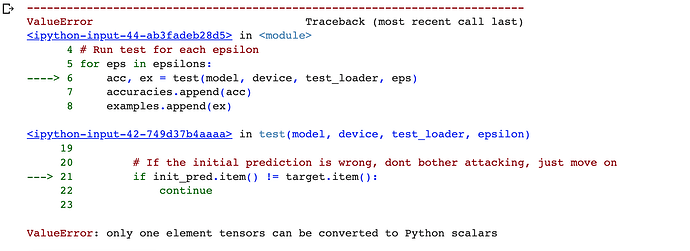Hello,
I tried to run adversarial attack on my test images. I trained my model that is a Resnet50. I copied the function for adversarial attack from pytorch.org. I received an error and I could not understand what is the problem.
Thanks
from __future__ import print_function
import torch
import torch.nn as nn
import torch.nn.functional as F
import torch.optim as optim
from torchvision import datasets, transforms
import numpy as np
import matplotlib.pyplot as plt
# NOTE: This is a hack to get around "User-agent" limitations when downloading MNIST datasets
# see, https://github.com/pytorch/vision/issues/3497 for more information
from six.moves import urllib
opener = urllib.request.build_opener()
opener.addheaders = [('User-agent', 'Mozilla/5.0')]
urllib.request.install_opener(opener)
epsilons = [0, .05, .1, .15, .2, .25, .3]
model = model.eval()
#FGSM attack code
def fgsm_attack(image, epsilon, data_grad):
# Collect the element-wise sign of the data gradient
sign_data_grad = data_grad.sign()
# Create the perturbed image by adjusting each pixel of the input image
perturbed_image = image + epsilon*sign_data_grad
# Adding clipping to maintain [0,1] range
perturbed_image = torch.clamp(perturbed_image, 0, 1)
# Return the perturbed image
return perturbed_image
def test( model, device, test_loader, epsilon ):
# Accuracy counter
correct = 0
adv_examples = []
# Loop over all examples in test set
for data, target in test_loader:
# Send the data and label to the device
data, target = data.to(device), target.to(device)
# Set requires_grad attribute of tensor. Important for Attack
data.requires_grad = True
# Forward pass the data through the model
output = model(data)
init_pred = output.max(1, keepdim=True)[1] # get the index of the max log-probability
# If the initial prediction is wrong, dont bother attacking, just move on
if init_pred.item() != target.item():
continue
# Calculate the loss
loss = F.nll_loss(output, target)
# Zero all existing gradients
model.zero_grad()
# Calculate gradients of model in backward pass
loss.backward()
# Collect datagrad
data_grad = data.grad.data
# Call FGSM Attack
perturbed_data = fgsm_attack(data, epsilon, data_grad)
# Re-classify the perturbed image
output = model(perturbed_data)
# Check for success
final_pred = output.max(1, keepdim=True)[1] # get the index of the max log-probability
if final_pred.item() == target.item():
correct += 1
# Special case for saving 0 epsilon examples
if (epsilon == 0) and (len(adv_examples) < 5):
adv_ex = perturbed_data.squeeze().detach().cpu().numpy()
adv_examples.append( (init_pred.item(), final_pred.item(), adv_ex) )
else:
# Save some adv examples for visualization later
if len(adv_examples) < 5:
adv_ex = perturbed_data.squeeze().detach().cpu().numpy()
adv_examples.append( (init_pred.item(), final_pred.item(), adv_ex) )
# Calculate final accuracy for this epsilon
final_acc = correct/float(len(test_loader))
print("Epsilon: {}\tTest Accuracy = {} / {} = {}".format(epsilon, correct, len(test_loader), final_acc))
# Return the accuracy and an adversarial example
return final_acc, adv_examples
accuracies = []
examples = []
# Run test for each epsilon
for eps in epsilons:
acc, ex = test(model, device, test_loader, eps)
accuracies.append(acc)
examples.append(ex)
The error is:
